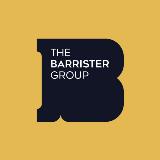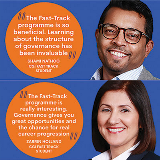*/

Congratulations, you’ve been offered tenancy! But how will things change? Fountain Court Chambers provides an insight into life as a new tenant
This article is based on a Fountain Court Chambers podcast hosted by Damien Bruneau, in which Hannah Bernstein, Joseph Leech, Francesca Ruddy and Daniel Schwennicke discuss their first few months as new tenants.
Becoming a tenant can be a daunting prospect. The pupil supervisor ‘safety blanket’ is removed, and as a new tenant your name will be on the work. In the podcast episode, Joseph Leech emphasised how rewarding it feels as a new tenant to take personal responsibility for what you’ve produced. You’ll be working with leaders so this provides a continued source of support and an opportunity to learn from the best. Hannah Bernstein reflected on the sense of security she felt when taken on as a new tenant after the long period of in-depth training.
Addressing perceptions that practice at the self-employed Bar can be a lonely place, the speakers said this is not their experience. Hannah entertained these doubts in the past, but said that the extensive support she had received during pupillage continued through into tenancy. Guidance and advice remains readily available. New tenants are paired in rooms with other tenants at the same level, and there are plentiful discussions among members working on cases together. Self-employed barristers also have regular contact with their clerks and other chambers staff, so all in all the job can be very collaborative.
Hannah was also wary of entering a potentially competitive atmosphere, especially given members of the same chambers can appear on opposing sides of a dispute. She found that not to be the case, and instead observed a pervasive ethos of support and collegiality – members took it as an opportunity to praise others on their work and to learn from different advocacy styles.
The speakers noted that self-employment can be liberating as you are able to dictate the work you do and when you do it. There are no set working hours and no fixed holiday limits, allowing the barrister to manage their work-life balance, which is seldom found in the early stages of other professional roles.
As clerks are responsible for assisting instructing parties in selecting the most appropriate barristers for any given matter (having regard to the required experience, skills and availability), the importance of a new tenant’s relationship with the clerking team quickly became clear to the speakers.
They said this is especially apparent in the first few years when juniors are establishing themselves as practitioners and exploring the work they most enjoy doing. Clerks can bring opportunities to the barrister’s attention, for example, to develop relationships with specific clients or to expand into certain practice areas, and ensure they have the best exposure during that initial period. Members at Fountain Court have dedicated clerks to help manage and develop their practices, meeting regularly, along with the marketing and business development team, to discuss aims and progress with regard to practice areas, clients, fee levels and a range of other topics.
New tenants quickly acquire a diverse caseload and undertake a mixture of ‘led’ and ‘unled’ work. Led work, where the new tenant works with at least one silk, often involves working on very significant commercial disputes as part of a team, whereas unled work typically involves handling smaller matters independently.
Working on smaller cases provides the opportunity to go to court and gain first-hand advocacy experience. Junior tenants are encouraged to undertake as much of their own advocacy as possible in the first few years of practice, to hone their skills and gain experience ‘on their feet’.
Damien Bruneau pointed out that, collectively, the new tenants in the episode had worked on cases spanning many different areas of practice after just a few months, demonstrating the range of work that is available within the initial months of tenancy.
At the start of their tenancies, for example, Daniel Schwennicke and Joseph spent three months as judicial assistants in the High Court, working with a number of judges, across a mixture of court work. Their duties included reviewing and analysing skeleton arguments, reading and summarising witness evidence, and accompanying judges to court. Joseph described how his first-hand experience of how trials were conducted in the Commercial Court and the Chancery Division was invaluable, in terms of gaining exposure to the other side of the Bench and understanding how judges go about their work.
Not everyone has the same journey to the Bar. Francesca Ruddy told listeners that she studied law and French at the University of Glasgow and then went on to practise as a disputes solicitor at a City law firm before transferring to the Bar. Daniel studied classics at the University of Oxford and went on to study law before completing the Bar course. Hannah was a competition economist at a ‘Big 4’ consulting firm before deciding that she wanted to experience the cases she was working on as a barrister and went on to complete a law conversion course. Joseph studied history at both the University of Cambridge and Yale University before undertaking a conversion course and applying for pupillage.
As a former solicitor, Francesca’s experience of what happens prior to the instruction of a barrister enables a deeper insight into what clients need from counsel. Hannah’s skills as an economist come into play when reviewing expert reports, particularly in competition cases, and she can quickly grasp the underlying commercial drivers. And even if one thinks that a certain background would not be conventionally useful for a career in law, the message was that it may assist in unexpected ways.
*
Overall, the podcast episode reinforced that life as a barrister can be collaborative and independent at the same time and, above all else, fascinating.


This article is based on a Fountain Court Chambers podcast hosted by Damien Bruneau, in which Hannah Bernstein, Joseph Leech, Francesca Ruddy and Daniel Schwennicke discuss their first few months as new tenants.
Becoming a tenant can be a daunting prospect. The pupil supervisor ‘safety blanket’ is removed, and as a new tenant your name will be on the work. In the podcast episode, Joseph Leech emphasised how rewarding it feels as a new tenant to take personal responsibility for what you’ve produced. You’ll be working with leaders so this provides a continued source of support and an opportunity to learn from the best. Hannah Bernstein reflected on the sense of security she felt when taken on as a new tenant after the long period of in-depth training.
Addressing perceptions that practice at the self-employed Bar can be a lonely place, the speakers said this is not their experience. Hannah entertained these doubts in the past, but said that the extensive support she had received during pupillage continued through into tenancy. Guidance and advice remains readily available. New tenants are paired in rooms with other tenants at the same level, and there are plentiful discussions among members working on cases together. Self-employed barristers also have regular contact with their clerks and other chambers staff, so all in all the job can be very collaborative.
Hannah was also wary of entering a potentially competitive atmosphere, especially given members of the same chambers can appear on opposing sides of a dispute. She found that not to be the case, and instead observed a pervasive ethos of support and collegiality – members took it as an opportunity to praise others on their work and to learn from different advocacy styles.
The speakers noted that self-employment can be liberating as you are able to dictate the work you do and when you do it. There are no set working hours and no fixed holiday limits, allowing the barrister to manage their work-life balance, which is seldom found in the early stages of other professional roles.
As clerks are responsible for assisting instructing parties in selecting the most appropriate barristers for any given matter (having regard to the required experience, skills and availability), the importance of a new tenant’s relationship with the clerking team quickly became clear to the speakers.
They said this is especially apparent in the first few years when juniors are establishing themselves as practitioners and exploring the work they most enjoy doing. Clerks can bring opportunities to the barrister’s attention, for example, to develop relationships with specific clients or to expand into certain practice areas, and ensure they have the best exposure during that initial period. Members at Fountain Court have dedicated clerks to help manage and develop their practices, meeting regularly, along with the marketing and business development team, to discuss aims and progress with regard to practice areas, clients, fee levels and a range of other topics.
New tenants quickly acquire a diverse caseload and undertake a mixture of ‘led’ and ‘unled’ work. Led work, where the new tenant works with at least one silk, often involves working on very significant commercial disputes as part of a team, whereas unled work typically involves handling smaller matters independently.
Working on smaller cases provides the opportunity to go to court and gain first-hand advocacy experience. Junior tenants are encouraged to undertake as much of their own advocacy as possible in the first few years of practice, to hone their skills and gain experience ‘on their feet’.
Damien Bruneau pointed out that, collectively, the new tenants in the episode had worked on cases spanning many different areas of practice after just a few months, demonstrating the range of work that is available within the initial months of tenancy.
At the start of their tenancies, for example, Daniel Schwennicke and Joseph spent three months as judicial assistants in the High Court, working with a number of judges, across a mixture of court work. Their duties included reviewing and analysing skeleton arguments, reading and summarising witness evidence, and accompanying judges to court. Joseph described how his first-hand experience of how trials were conducted in the Commercial Court and the Chancery Division was invaluable, in terms of gaining exposure to the other side of the Bench and understanding how judges go about their work.
Not everyone has the same journey to the Bar. Francesca Ruddy told listeners that she studied law and French at the University of Glasgow and then went on to practise as a disputes solicitor at a City law firm before transferring to the Bar. Daniel studied classics at the University of Oxford and went on to study law before completing the Bar course. Hannah was a competition economist at a ‘Big 4’ consulting firm before deciding that she wanted to experience the cases she was working on as a barrister and went on to complete a law conversion course. Joseph studied history at both the University of Cambridge and Yale University before undertaking a conversion course and applying for pupillage.
As a former solicitor, Francesca’s experience of what happens prior to the instruction of a barrister enables a deeper insight into what clients need from counsel. Hannah’s skills as an economist come into play when reviewing expert reports, particularly in competition cases, and she can quickly grasp the underlying commercial drivers. And even if one thinks that a certain background would not be conventionally useful for a career in law, the message was that it may assist in unexpected ways.
*
Overall, the podcast episode reinforced that life as a barrister can be collaborative and independent at the same time and, above all else, fascinating.

Congratulations, you’ve been offered tenancy! But how will things change? Fountain Court Chambers provides an insight into life as a new tenant

No-one should have to live in sub-standard accommodation, says Antony Hodari Solicitors. We are tackling the problem of bad housing with a two-pronged approach and act on behalf of tenants in both the civil and criminal courts

Pupillage offers hit new record exceeding pre-pandemic levels, Bar Council report finds

What’s it like being a Senior Crown Prosecutor? Stuart Page describes what drew him to the role, the skills required, and a typical day in the life

Harry Hodgkin, CEO of The Barrister Group, gives an insight into Chambers' core principles and the individual barrister's experience

Congratulations to the Crown Prosecution Service – a Top 10 Employer for Working Families 2023

With the explosion of interest in governance and the growing need to be multi-skilled to keep career options open, adding an extra string to your bow is not without its merits. The Chartered Governance Institute UK Ireland (CGIUKI) Fast Track for the Chartered Governance Qualifying Programme could be ideal for experienced professionals to reach chartered governance status